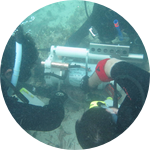About This Project
As atmospheric carbon dioxide increases, the pH of the ocean will decrease and corals will suffer. This project aims to determine if corals can acclimate to future ocean pH changes by studying corals living at submarine springs in Mexico where they have been exposed to low pH for hundreds of years. If we're successful, we'll identify how corals can protect themselves from ocean acidification and design strategies to preserve coral reefs.Ask the Scientists
Join The DiscussionWhat is the context of this research?
Coral reefs are among the most productive ecosystems in the world, and
they provide many crucial benefits to human communities. The ability for corals to form their skeletons is declining as atmospheric CO2 dissolves in surface waters,leading to worldwide loss of coral reef ecosystems as we know them.
We found some submarine springs in Mexico where corals have been growing at low pH for hundreds of years. At this site corals have had ample time to acclimate to low pH conditions. We will take advantage of this unique setting to study what enables some corals to grow at low pH and determine if all corals have this capacity.
Specifically we will identify the gene pathways involved in differential response to ocean acidification. This will provide much needed insight into the molecular mechanisms that may allow corals to survive future climate change scenarios. Results from this work will enhance our ability to predict the fates of corals and coral reefs under future ocean acidification scenarios.
What is the significance of this project?
The increasing use of fossil fuels, combined with the effects of deforestation, has led to an overall increase in atmospheric CO2. About 30% of CO2 added to the atmosphere has been sequestered by the oceans; changing ocean chemistry. This is popularly known as “ocean acidification”. The changes in ocean chemistry are likely to impact many aspects of marine ecosystems, and are one of the most important environmental concerns of our time.
One outstanding question concerns the potential of corals and coral reefs to acclimate and/or adapt to ocean acidification. The submarine springs in Mexico provide a unique setting to study acclimation because the corals at the submarine springs have been exposed to low pH for their entire lifespans and may have acclimated to survive and calcify under such conditions, or natural selection may have favored individuals with genotypes better adapted to low pH. If organisms in this ecosystem do have the ability to acclimate or adapt, they may be less impacted by future ocean acidification, and such knowledge could enhance protection, management, and preservation of this and similar habitats as potential ecological refugia.
What are the goals of the project?
Our major objective for this project
is to take advantage of the unique setting of the low pH submarine springs in Mexico to fill important gaps in understanding the physiological mechanisms and potential responses of calcifying organisms to low pH. We will conduct observations and experiments that will shed light on: (1) the potential of several Caribbean corals to acclimate or adapt to low pH conditions; and (2) the roles of symbiont type, symbiont density and nutrition on coral calcification under low pH conditions.
Specifically, we will set up reciprocal transplantation experiments to evaluate genotypic and environmental components
of coral responses to low pH. Reciprocal transplant experiments are based on moving genetically identical (cloned) individuals to and from different sites. We will use 3-5 coral species and move them from/to spring and control sites. Transplants will be monitored to asses survival for a year. After one year each coral will be analyzed for calcification rates and we will perform transcriptomic investigations of gene expression and gene sequence differences in the corals. Patterns of gene expression will be investigated for potential gene pathways that are involved in the differential response of corals exposed to acidified seawater conditions.
Budget
Funds will be used to cover travel expenses to conduct the field work. Buy sensors that will be used to continuously monitor the discharge from the submarine springs and for the cost of preforming the genetic work for the corals collected.
Endorsed by
Meet the Team
Team Bio
Adina Paytan is a Research Professor of Oceanography at the University of California Santa Cruz (UCSC). She obtained her B.Sc. double major in Biology and Geology and an M.S. in Oceanography from the Hebrew University in Jerusalem. She also pursued an M.S. degree in science education at the Weizmann Institute of Science in Rehovot. Professor Paytan earned her Ph.D. at the Scripps Institute of Oceanography. Her research interests lie in the fields of biogeochemistry, chemical oceanography and paleoceanography. An over-arching goal of this research is to understand the processes and feedbacks operating in the Earth System and how they relate to global changes in climate and tectonics. In addition, she is interested in natural and anthropogenically induced perturbations that affect biogeochemical processes and their impact on humans and the environment. More information can be found on the lab web page: http://pmc.ucsc.edu/~apaytan/index.htmlPress and Media
This research in the newshttp://www.livescience.com/17371-corals-acidic-sub...
http://environmentalresearchweb.org/cws/article/op...
http://www.nsf.gov/news/news_summ.jsp?cntn_id=1282...
http://environmentalresearchweb.org/cws/article/op... http://www.sciencedaily.com/releases/2011/11/111128132700.htm http://www.earthtimes.org/conservation/ocean-acidification-affecting-coral-reef-ecosystems/1661/
Additional Information
Link to Dr. Paytan's web page which includes research summaries and publicationshttp://pmc.ucsc.edu/~apaytan/index.html
Open Access publication
http://www.pnas.org/content/early/2013/06/12/13015...
Ocean Acidification links
http://oceanacidification.net/
http://ocean.nationalgeographic.com/ocean/critical...
http://ngm.nationalgeographic.com/2011/04/ocean-ac...
http://www.igbp.net/publications/summariesforpolic...
http://www.igbp.net/publications/summariesforpolic...
http://www.igbp.net/publications/summariesforpolic...
http://www.whoi.edu/main/topic/ocean-acidification
Project Backers
- 9Backers
- 5%Funded
- $250Total Donations
- $27.78Average Donation

